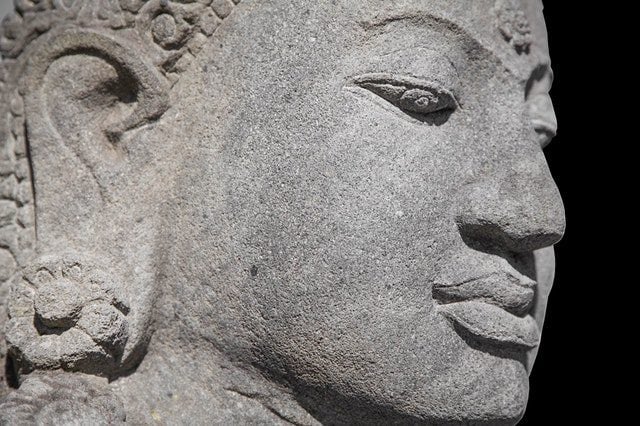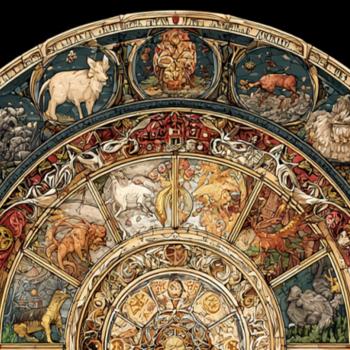
Stop me if you’ve heard this one before: “All Scripture is God–breathed and is useful for teaching, rebuking, correcting and training in righteousness, so that the servant of God may be thoroughly equipped for every good work.”
That’s probably the most commonly-quoted verse from the New Testament whenever anyone questions the accuracy or truthfulness of what we read in the Bible.
It’s found in 2 Timothy 3:16-17 [an epistle which many Bible scholars admit was most-likely not actually written by the Apostle Paul], and what it says – and what it really means – are two entirely different things.
For example: When Paul [or Pseudo-Paul] wrote this sentence, it’s highly unlikely that what they had in mind was the book that most Protestants today refer to as “The Bible”. The Biblical Canon of Paul’s day wasn’t exactly the same as our own.
Plus, it’s also very unlikely that “Paul” was thinking of his own letters as “Scripture” in any way, shape or form. These were letters written to encourage other believers who were struggling with various challenges that he wanted to address. That’s all.
Still, the verse above does say: “All Scripture is God-breathed…”. Or, does it?**
Actually, no. That’s not what the verse actually says.
Yes, in your English translations of that verse you will find the phrase “All Scripture is God-breathed…”, but in the Greek the word rendered as “Scripture” is simply the common word for “writings” [graphia].
So, what this verse actually says is: “All the God-breathed writings are useful for teaching, rebuking, correcting and training in righteousness, so that the servant of God may be thoroughly equipped for every good work.”
In other words: Everything is inspired by God and can be useful for our spiritual growth, enlightenment, and development as followers of Christ.
As an example: When Paul goes to Athens and sees the idol to the “Unknown God”, he stands before the pagan unbelievers and declares that Christ has fulfilled their scriptures [or their “writings”] about a God who is unknown to them. He even quotes their own prophets and poets to show how Christ has fulfilled what was written.
So, what if what is really meant by this verse is that Christ is the fulfillment of every scripture, whether Jewish, or Pagan, or Hindu, or Buddhist, etc.?
In other words, if Jesus is the “Way, the Truth and the Life”, then we can expect to see Christ in all truth, and in all ways, and in every life.
This means we shouldn’t be surprised to learn that the Hindu Vedas [scriptures] teach something like this:
“God Himself is the sacrifice” [Satpatha Brahmanam] and In Tandya Maha Brahmanam of Sama Veda that “God would offer Himself as a sacrifice and obtain atonement for sins”.
“The word is the indestructible God.” (Brhadaranyaka Upanishad 4:1, 2).
The Hindu scriptures also highlight the physical suffering of Christ. [NOTE: There was no Hindu god or goddess who bore such suffering on behalf of sinners]:
“The sacrificial victim is to be crowned with a crown made of thorny vines” (Rigveda 10.90.7, 15)
“After death, His clothes are to be divided among the offerors” (Ithareya Brahmanam)
“His hands and legs are to be bound to a yoopa (a wooden pole) causing blood shed” (Brhadaranyaka Upanishad, 3.9.28)
“Before death, He should be given a drink of somarasa” [an intoxicating herbal juice] (Yajur Veda 31).
“None of His bones will be broken” (Ithareya Brahmanam 2.6).
It should not surprise us in the least to learn that Buddha taught something very similar to what Jesus taught about loving our enemies, turning the other cheek, or treating others as we want to be treated.
Why? Because all truth is God’s truth and because all the writings are “God-breathed”, not just the Jewish writings, or the Pagan writings, but “all writings are profitable to us for teaching, instruction and wisdom.”
Christ fulfills the Scriptures – all of the Scriptures.
This does not diminish the Bible. It magnifies Christ above the Bible and above every Holy Book ever written.
Christ has not only accomplished everything in the Law and the Prophets, as he promised to do, He also accomplished what was written and promised in all the writings.
Therefore, all the writings can point us to Christ. All the God-breathed writings are profitable for us.
As long as our eyes are set on Christ, and our relationship is with Him [and not any book or man-made religion], we can learn to see and to know Christ as He has been revealed and illuminated to us, regardless of the source.
What do you think?
NOTE: Special thanks to my dear friend, Chuck McKnight, who pointed out to me that the word for “Scripture” in 2 Timothy 3:16 is actually the simple Greek word for “writings” [graphia] and inspired this post.
**
Keith Giles is the author of several books, including the forthcoming “Jesus Unbound: How the Bible Keeps Us From Hearing the Word of God”, available July 4th, 2018.
He is also the author of the Amazon best-seller, “Jesus Untangled: Crucifying Our Politics To Pledge Allegiance To The Lamb”. He is the co-host of the Heretic Happy Hour Podcast on iTunes and Podbean. He and his wife live in Orange, CA with their two sons.
Please, join me at one of these upcoming events:
*The Nonviolent Love of Christ: How Loving Our Enemies Saves The World, with Joshua Lawson and Keith Giles on Saturday, June 16 in Portsmouth Ohio. Register here>
*Crucifying Our Politics with Keith Giles on June 24 in Cleveland, OH. Register here>
BONUS: Unlock exclusive content including blog articles, short stories, music, podcasts, videos and more on my Patreon page.













